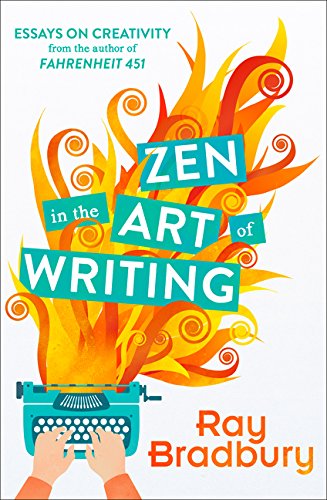Please click here to read Zen in The Art of Writing Part 1 and click here to read Zen in the Art of Writing Part 2.

Zen in the Art of Writing.
We all would like to find Zen in the Art of writing. Sometimes it can be a frustrating or even elusive process that can seem challenging and even daunting to some. However, Bradbury writes that the three main ideas you need to remember when writing are: WORK, RELAXATION and DON’T THINK. But how would those help you find Zen in the art of writing, I hear you ask?
WORK doesn’t sound like a Zen idea. It conjures up images of effort, sweat and exhaustion. However, Bradbury believes you can find Zen in ‘WORK’ by instead of being a slave to it, striving to become its partner, “Once you are really a co-sharer of existence with your work, that word will lose its repellent aspects”. Often we think of work as something we need to feel guilty about if we are not doing it, or on the other hand, we can feel exhausted and fed-up if we are working too much. Work can be a means to an end, often work is just a process we go through to make money, “The money becomes the object, the target, the end-all and be-all”. If that’s all it is then work degenerates into boredom because it is only a means to an end. So, don’t frame your work or be creative for the sole purpose of making money or fame and fortune. Those are great and a happy by-product of your work but Bradbury believes that you, the writer, who is curious about creativity, actually wants to “make contact with that thing in yourself that is truly original. You want fame and fortune, yes, but only as a reward for work well and truly done. Notoriety and a fat bank balance must come after everything is finished and done”. That means that while writing and creating they shouldn’t really be a factor in the process but an after-thought. As I have written before, you must be authentic, write for the joy of writing and the rest will come. Often the greatest reward a writer can have, although being paid for your art is nice, is when, “someone rushes up to you, his face bursting with honesty, his eyes afire with admiration and cries, “That new story of yours was fine, really wonderful!”. At that moment the money and the work all seem worthwhile as you have touched a person who has seen and felt something from your writing, they have enjoyed what you have created and reacted to it.
Each of you, curious about creativity, wants to make contact with the thing in yourself that is truly original.
-Ray Bradbury
Bradbury believes that once we have made a partner of work and not dwelled on whether work will make us money or make us famous but rather on the art of writing itself and the joy of weaving stories, then what comes next is RELAXATION. The ‘WORK’ becomes less like ‘WORK’ and we settle into a happy rhythm. “The mechanical begins to fall away. The body begins to take over. The guard goes down. What happens then? RELAXATION”. We relax into our creativity and through that the muse can flow more freely and there is less pressure on you. You are creating for the beauty of it, for yourself, which lets the originality and authenticity come through and thus improves your writing.
‘The mechanical begins to fall away. The body begins to take over. The guard goes down. What happens then? RELAXATION’.
-Ray Bradbury
The last idea that Bradbury encourages writers to take on is ‘DON’T THINK’. Bradbury is not telling you to not think at all, obviously some effort has to go into creating a story but to not OVERTHINK. Get what you want to down on paper, let it flow, you can edit it later, let the joy of writing flow. remember when you were a child and you just wrote whatever came to mind, let your imagination go back to that place without judgement or fear and create. This goes hand in hand with the RELAXATION, not overthinking leads to more relaxation which leads to more creativity and in turn more ‘WORK’. I hear your scoffs, and Bradbury has an answer for you, ”Impossible! you say. How can you work and relax? How can you create and not be a nervous wreck? It can be done. It is done, every day of every week of every year. Athletes do it. painters do it. Mountain climbers do it. Zen Buddhists…do it. Even I do it. And if even I can do it, as you are probably hissing now, through clenched teeth, YOU can do it to!”.
WORK, RELAXATION, DON’T THINK are not mutually exclusive, they should be used simultaneously. They naturally flow into one another as each facilitates they other. ‘ For if one works, one finally relaxes and stops thinking’. True creation occurs then and only then’. That’s true of this process anyway around, if you don’t over think, you will relax and work will come easier. If you relax, you won’t over think and then work will become easier. These are Bradbury’s three tools to help us find Zen in the Art of writing. A kind of mantra if you will. A writer can got lost on their creative journey, “Through wanting literary fame too quickly. From wanting money too soon. If only we could remember, fame and money are gifts to be given us only after we have gifted the world our best, our lonely, our individual truths”. Writing comes from you, from your experiences and perspectives of the world, “There is only one type of story in the world. Your story”. So WORK on that and DON’T THINK so you can RELAX into your creativity. As Bradbury says, “The time will come when your characters will write your stories for you, when your emotions, free of literacy cant and commercial bias, will blast the page and tell the truth. Remember: Plot is no more than foot prints left in the snow AFTER your characters have run by on their way to incredible destinations. PLOT is observed after the fact rather than before. It cannot precede action. It is the chart that remains when action is through. That is all PLOT ever should be. It is human desire let run, running, and reaching a goal, It cannot be mechanical. it can only be dynamic. So, stand aside, forget targets, let the characters, your fingers, body, blood and heart DO”.
‘It is wise a writer who knows his own subconscious.’ And not only knows it but lets it speak of the world as it and it alone has sensed it and shaped it to its own truth’.
-Ray Bradbury
So if we can consider everything we have learnt from Bradbury and his ideas and ways to find Zen in the art of writing we can find one overarching theme and the only thing left to do is give the last word to the man himself. ‘The true test is in the doing. Be pragmatic, then. If you’re not happy with the way your writing has gone, you might give my method a try. If you do, i think you might easily find a new definition for WORK. And the word is LOVE’.
I hope you have enjoyed this three part series on ‘The Art of Zen in Writing’.
Purchase the book here if you would like to own it yourself.
If you enjoyed this post, do not forget to like and subscribe for more. Maybe even consider becoming a Patron.




